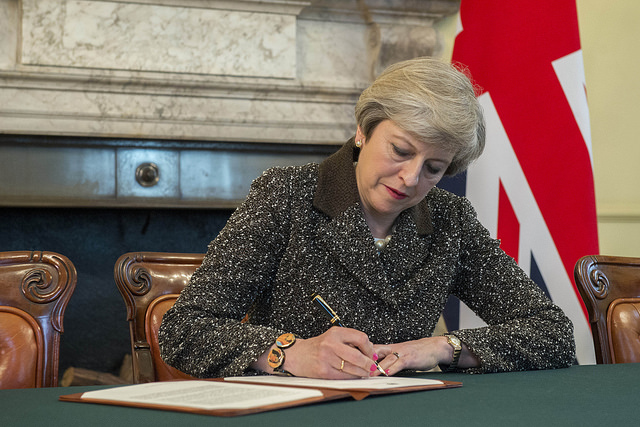It is predicted that Prime Minister Theresa May’s Conservative Party will achieve a significant victory in the upcoming general election on June 8. If the predictions are correct — though at the time of writing Labour is advancing in the polls — May will find herself in a more comfortable position domestically, governing with a larger majority. On the international stage, however, will this increase in domestic power lead to an advantage for the United Kingdom at the negotiation table in Brussels?
The Brussels-based press seems to think so, writing that “victory will allow May to head into EU-UK Brexit negotiations with a strengthened hand at home” and “if the U.K. holds a general election in June, Brussels can only lose.” May herself explicitly framed her decision to hold a general election as a move to increase the UK’s negotiating position, so that the UK can play “the strongest hand possible in those negotiations to get the best possible deal”.
These expectations may be completely misplaced. An influential work by Robert Putnam (1988) suggests that the UK will actually have a weaker hand in negotiations if the Conservative Party wins a greater majority. This short blog post uses a theoretical approach built upon Putnam’s two-level game that predicts that by increasing her domestic power, May is limiting her negotiating position.
The two-level game
A leader who is domestically strong should be in a stronger position to demand concessions when bargaining with other countries because the leader has the full support of his or her constituents. This is the realist perspective of international relations in which the national leader is understood through the exclusive capacity as a head negotiator of his or her country, looking to achieve the best possible deal for his or her nation. Leaders viewed from the realist perspective are concerned with advancing their countries’ national interests, protecting national security and looking to gain more power.
Building on this realist logic, Putnam proposed that national leaders are not only advancing their countries’ interests, but also constantly seeking to appease their domestic constituency. Based on his observations of G8 negotiations in the 1970s, he concluded that domestic politics influence international politics and vice versa. International agreements, like trade deals, can be seen as a two-level game where a national leader is simultaneously negotiating at two tables — the domestic and international. A successful player makes synergist gains: “clever players will spot a move on one board that will trigger realignments on other boards, enabling them to achieve unattainable objectives” (Putnam, 1988, 434).
Moravcsik (1993a, 28) wrote that an example of this this strategy is when a leader chooses to “tie his or hands” — a leader may make the domestic ratification of an agreement more difficult so as to be in a stronger position internationally. The idea here is that a negotiator who can point to a genuine domestic constraint is able to make less concessions and therefore gain a better deal on the international stage. How often this happens is up for debate, but it is generally agreed that governments will occasionally tie their hands deliberately (Pahre 1997, Hug and Schulz 2007). Hodson and Maher (2013) argue that the UK has done this before, using the threat of difficulties in treaty ratification to secure opt-outs from the European Union, including the 2011 European Union Act which led to the requirement of referendums to ratify certain treaties.
Examples – US & EU
A clear example where domestic constraints aid international negotiations is found in the American system. The executive branch negotiates trade deals and treaties, but requires a two-thirds majority approval from the Senate for full ratification of the agreement. The hurdle of a two-thirds majority enables the executive to play the soft cop on the international negotiating stage “against congress’ hard cop routine” (Cameron and Tomlin 2000).
Similarly, on the few occasions when the EU actually manages to sign a trade deal (for example with Canada), the deals are usually very favourable to the EU, partially due to the complex approval and ratification processes (sometimes involving all of the regional and national parliaments). EU negotiators are able to point to their domestic constraints and avoid conceding key points that they might otherwise have conceded. Governments do not simply walk away from the table when negotiating with the US and the EU because they are aware that the EU and the US have genuine domestic ratification constraints – they quite literally cannot give certain concessions if they cannot get them past the Democrats in the Senate/or the socialists in the Parliament of Wallonia.
The key point is that to enjoy the benefits of credibly asking for concessions on the international stage, a leader must have a legitimate legislative hurdle on the domestic front. Currently, May is constrained by a relatively slim majority in Parliament of only 12 seats. May can therefore credibly claim that she will struggle to pass a deal that does not appeal to the economically liberal, pro-single market faction in her own party. May and her negotiators could cite their domestic constraints as a reason to make fewer concessions in Brussels. By choosing to increase her Parliamentary majority through new elections, Prime Minister May has chosen to throw away her negotiating advantage.
Economically liberal Tories
The Conservative Party was divided on the referendum to exit the EU in 2016. While the “Brexiteers” now hold power, they must convince their Conservative colleagues in Parliament to vote for the Brexit agreement that May will present for a “take it or leave it” vote following international negotiations. Many of these Conservative MPs, like George Osborne, may no longer reasonably expect May to produce a deal that includes UK membership in the single market, but they will expect some sort of economically sound package. Currently, at the negotiation table in Brussels, May could use her narrow parliamentary majority as a bargaining tool, telling her international negotiating partners that she could never get a deal through Parliament without preferential access to the single market. However, May has decided to untie her hands from domestic constraints. If she gains more seats in the upcoming election, May is much less susceptible to rebellions from her own MPs , and she will find it easier (though not necessarily easy) to pass any agreement that she makes in Brussels. Ultimately, by untying her hands and increasing her mandate, May counterintuitively limits her bargaining power, which could lead to a worse deal for the UK.
References
Cameron, M.A. & Tomlin, B.W. 2002. THE MAKING OF NAFTA: How the Deal Was Done. Ithaca: Cornell University Press.
Evans, P. 1993. ‘Building an integrative approach to international and domestic politics: Reflections and projections’, in P. Evans, H. Jacobson and R. Putnam (eds), Double-Edged Diplomacy: Interactive Games in International Affairs (Berkeley, CA: University of California Press), 397–430.
Hug, S. and Schulz, T. 2007. ‘Referendums in the EU’s constitution building process’, Review of International Organizations, 2:2, 177–218.
Hodson, D. and Maher, I. 2013. British Brinkmanship and Gaelic Games: EU Treaty Ratification in the UK and Ireland from a Two Level Game Perspective. The British Journal of Politics & International Relations, 16(4), pp.645-661.
Milner, H. and Rosendorff, B. 1996. Trade Negotiations, Information and Domestic Politics: The Role of Domestic Groups. Economics & Politics, 8(2), pp.145-189.
Moravcsik, A. 1993. Introduction: Integrating International and Domestic Theories of International Bargaining. In: P. Evans, H. Jacobson and R. Putnam, ed., In Double-Edged Diplomacy: International Bargaining and Domestic Politics. Berkeley: University of California Press, pp.3-42.
Pahre, R. 1997. “Endogenous Domestic Institutions in Two-Level Games and Parliamentary Oversight of the European Union.” Journal of Conflict Resolution 41: 147- 174.
Putnam, R. 1988. Diplomacy and Domestic Politics: the Logic of Two-Level Games. International Organization, 42(03), pp.427-460.
Schelling, T. 1960. The Strategy of Conflict. Cambridge: Harvard University Press.





